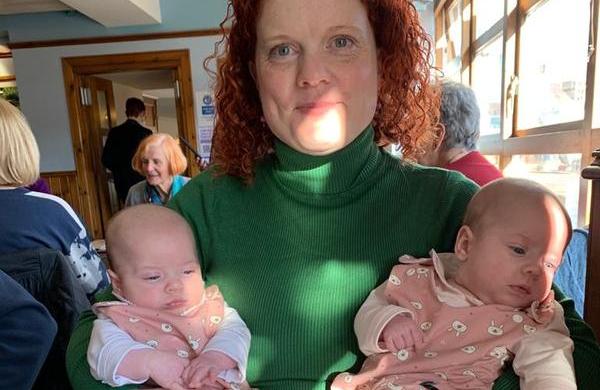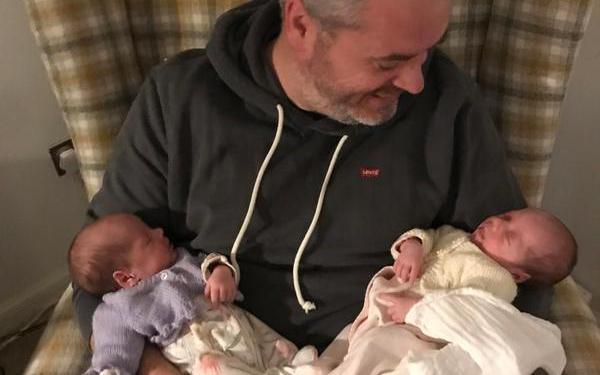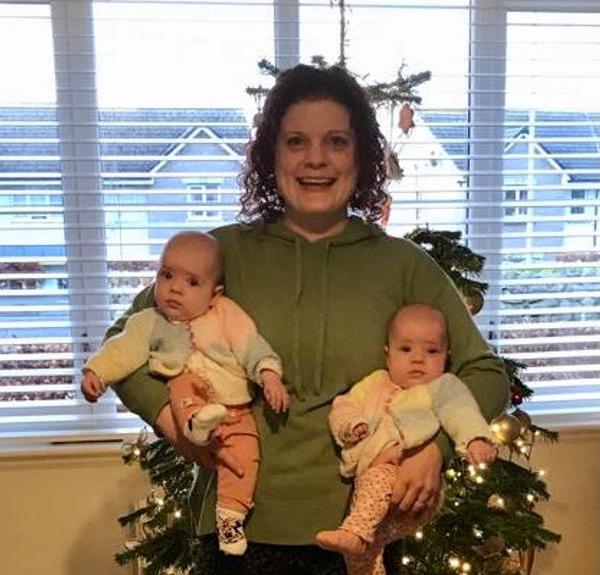23 December 2021
It was Christmas Eve 2020 and Catriona Ross had just unwrapped her very own Christmas miracle, a positive pregnancy test following IVF treatment.
Catriona and her husband Kriss dreamed of having another child to add to their family as a little brother or sister for their firstborn, Rosie, three.
Yet they knew the odds were against them, with just one embryo to transfer and an IVF attempt that would hopefully bring them the happy news they so desired.

When the positive result showed up on the pregnancy test, Catriona could hardly contain her excitement but was a little apprehensive until she had a scan.
The night before her scan, Catriona had a sign she was expecting more than one baby.
Catriona, who lives close to Aberdeen, said: “I had a dream the night before the seven-week scan that it was twins. I didn’t share that with Kriss at the time.
“To say Kriss was in shock would be an understatement!
“On our way home after the scan we were discussing how much things were going to change and that we would definitely be needing a bigger car.
“The 12-week scan confirmed the twins were still viable and that they were sharing a placenta.”
The journey to parenthood took a worrying turn for Catriona and Kriss when doctors revealed the twins had a life-threatening condition called Twin to Twin Transfusion Syndrome (TTTS).
As the family went through this difficult time, they found that Twins Trust could be there with them through good times and bad.
Shauna Leven, Chief Executive Officer of Twins Trust, said: “We provide our families with support when they need it most.
“During the festive season plus the ever-changing situation during the pandemic, we know times can be hard and we are here to listen and help when we can.”

Catriona added: “Reading blogs and information on the Twins Trust website really helped provide me with some positivity and hope, whilst keeping realistic when our twins developed TTTS earlier this year. There were some positive stories and some not-so-positive but that was really valuable. “It was more realistic and helpful.”
TTTS is a rare but life-threatening condition that affects 10 to 15% of identical twins that share a placenta (monochorionic twins). TTTS can also occur in triplet or higher order pregnancies with monochorionic twins.
Catriona said: “At the 16-week scan, the consultant struggled to find a line between the amniotic sacs. The consultant suspected that the sac around the donor twin was beginning to stick to her, like cling film.”
The scan images were sent to a fetal medicine consultant at the Queen Elizabeth University Hospital in Glasgow, who reviewed the pictures and confirmed the TTTS diagnosis. The parents-to-be were then told the worrying news that their babies’ lives were at risk.
Catriona added: “The consultant in Glasgow was very kind but very matter of fact. We knew TTTS was serious but we didn’t realise quite how serious it was.”
The consultant drew a diagram for the parents-to-be to explain what was happening to the twins and to discuss what the options were.
One of the options was laser therapy, performed on the babies while they are still in the womb.
Catriona added: “It was deeply worrying to hear that if nothing was done, then we were likely to lose one baby and possibly both.
“We were told something could happen at any time to either or both babies.
“There was no doubt that we would have the laser surgery. We had to give them both the best chance.”
Catriona added: “I think families need to be prepared for these difficult conversations.
“Whilst awaiting surgery, the doctors and wider team at Aberdeen Maternity Hospital were absolutely fantastic and so supportive, seeing us for regular scans to reassure us during this anxious period.”
The specialist surgery lasted just 40 minutes as surgeons used a laser fibre to seal off blood vessels in the shared placenta so that both babies would receive a more equal share of blood.
Catriona said: “We then had an anxious wait overnight and it was a huge relief in the morning following a scan, to find out that both twins were alive”.

A c-section was planned for 32 weeks but when Catriona reached 31 weeks and four days, the couple faced a medical emergency.
“My placenta ruptured and I was haemorrhaging,” Catriona said.
Catriona was rushed into theatre for a c-section and Isla and Catie safely made their arrival into the world on June 30 2021.
“There was such relief and joy once our babies were safely here,” she said.
The twins needed a month of care in the neonatal unit, before they were finally able to come home and be with their big sister.
Catriona said: “There is hope out there if you are diagnosed with TTTS. You have to try and keep positive, as difficult as that is, as the surgery can work.
“We are so lucky to have the NHS and all the wonderful doctors and nurses that can deliver this specialised care.”
Catriona has praised the work of Twins Trust and the support she received from the charity during her pregnancy.
She said:
At one of our early appointments, staff at Aberdeen Maternity Hospital recommended looking at the Twins Trust website and suggested it be our first port of call. I can completely understand why, it is a fantastic resource.
“We are so lucky to have had a very happy outcome and both twins are now doing so well.
“They really are our wee miracles.”
-strap.svg)



